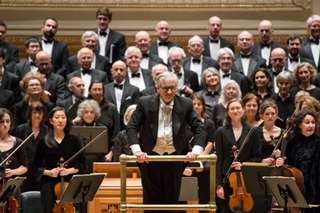|
Back
New York
Isaac Stern Auditorium, Carnegie Hall
04/25/2014 -
Ralph Vaughan Williams: Toward the Unknown Region
Tom Cipullo: Ode For a Secular City (World Premiere)
Johannes Brahms: Nänie, opus 82
Anton Bruckner: Te Deum
Kristina Bachrach (Soprano), Virginia Verrez (Mezzo-Soprano), Noah Baetge (Tenor), Michael Anthony McGee (Bass-baritone)
The Cecilia Chorus of New York with Orchestra, Mark Shapiro (Music Director and Conductor)

M. Shapiro, Cecilia Chorus (© Courtesy of the artists)
“It’s an odd situation,” notes composer Tom Cipullo, that the Cecilia Chorus, like other choruses centers on mainly New Testament religious works.
Especially, he continues, when a large percentage of New York must be “either members of other faiths, or atheists, or agnostics or Wiccan, or something else I haven’t thought of.”
(Or, he might have noted where the one-time St Cecilia Chorus is conducted by a man named Mark Shapiro.)
Mr. Cipullo put his thoughts into action with Credo for a Secular City, commissioned and premiered by the Cecilia Chorus last night. Granted, the 20th Century has two other religious works which transcend God–Bernstein’s Mass and Benjamin Britten’s War Requiem, the latter presented a week from now in Carnegie Hall.
But Mr. Cipullo chose his words wisely, beginning with a rather religious Credo, that was segued–not with irony or especial point, but inevitably–into the post-Cartesian words, “I doubt, therefore I think, therefore I am.”
In other words, Mr. Cupillo put the Cross before Descartes.
The composer, though, is a very accomplished choral composer, and nothing was either stagy or stolid or too clever for its secular message. Written for the large Cecilia Chorus and medium-sized orchestra, the “Credo” was basically in one section, with large choral numbers, with some cryptic intertwinings of other music (I caught Beethoven’s Ninth, Handel’s Alleluja Chorus, and a little Verdi, but there might have been more.)
The poetry of Shakespeare was spoken or sometimes sung by the powerful bass-baritone Mark Anthony McGee, but this was a choral piece by and large. Setting the words to Milton, Matthew Arnold, naturalist John Burroughs and others is no easy task. But Mr. Cupillo’s basic conservative feeling and his natural feeling for the words helped immensely.
Save for the rare exclamation (“Guilty!” shouts the chorus), the timbre had a certain sameness to it. Thus, the soft lyrical ending to the last poem gave an aureole of religious anti-holiness to the piece. In that poem, “I was never able to pray” by Edward Hirsch, the chorus quietly intones the poet’s action of staring “into the dome of a sky that never ends and see my voice sail into the night.”
Exactly what the Cecilia Chorus did. And as they have been doing for nearly a century now. Handling a chorus of Edwardian proportions (around 150) makes conductor Shapiro’s choices challenging ones. The members of the Cecilia Chorus are professionally adept enough to sing with the great orchestras of the world. But the orchestra used last night was hardly in that electrifying field. Their intonation was not blurred, but it hardly possessed that electrifying sound necessary for some of the music last night.
Specifically, for one who relishes Von Karajan’s performance of Anton Bruckner’s Te Deum, the summa cum laude of laudatory gravitas, the performance last night was powerful enough and vocally sensational but didn’t quite shake the rafters.
Despite that shortcoming and despite Mr. Cupillo’s efforts to show a “secular” New York, when those rolling octaves of the Bruckner piled on top of each other with drums and choruses praising God...well, one thought, maybe that “heavenly Father” stuff isn’t so absurd at all.
Even in Beethoven choral works, one finds a bit of stuffing. But not a single measure in the Te Deum is cheap or meretricious, every measure is songful, lyrical and yes, spiritual. Bruckner’s major choral work is still the magnum opus for the great symphonist.
Mr. Shapiro had not only the benefit of his great chorus, bass McGee, but in soprano Kristina Bachrach, a voice of utter purity. Her Tibi Cherubim et Seraphim incessabili voce proclamant, (“the Cherubim and Seraphim proclaim”), was youthful, earnest with the slightest trill on the top, giving that angelic patina to those ever-majestic measures.
Mr. Shapiro included two other works either. One wouldn’t usually pair up Vaughan Williams with Walt Whitman, but his early Toward The Unknown Region was a deft enough setting of the ungainly meters. Brahms’ Nänie is his lament for a friend, with words by Schiller. It is a tranquil work, much like parts of his Requiem, and the chorus and orchestra suitably underplayed the music.
Still, leaving Carnegie Hall last night, it was the Bruckner which swirled around my brain. New York on a Friday in Spring, is ever-secular, ever-pagan. But after the Bruckner, even the non-believer had to say, “Per singulos dies benedicimus te”–“We thank Thee every day”, even for our devout, divine doubting.
Harry Rolnick
|